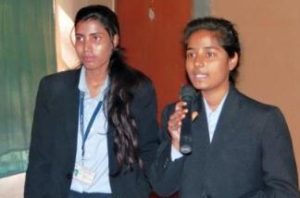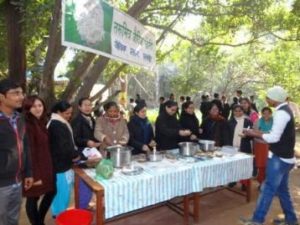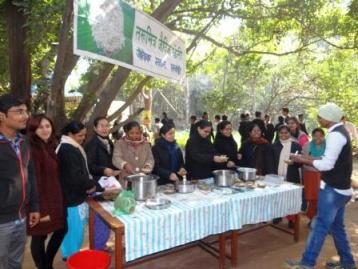The harvest festivals are on, and of course, every harvest festival is part of the celebration of the eco-system: Pongal, Sankranti, Bihu … all celebrated around 14-15 January.
In Patna, at the Taru Mitra Bio reserve, students from Don Bosco, St. Joseph’s, May Flower, A.N College and St. Xavier’s College congregated under the sprawling Kamroop tree to welcome back the life-giving Sun from the Southern hemisphere.
The Chief Guest of the occasion, the director of May Flower higher secondary School, Sri Jairam Sharma led the students to the tasting of Organic ‘chewda’ (flattened rice) and curd.
Tarumitra students celebrate the Solar feast of Makar Sankranti as Chewda Dahi partv, a festival of the Sun. Traditionally people all over the Bihar partake of flattened rice, sesame seeds and freshly made curd for the occasion. The students under the leadership of Anushka and Shivani from St. Xavier’s College organized the Organic Festival of Rice with the same fare.

“The distinct feature of the celebration was that the feast was entirely organic and eco-friendly,” said Anushka. Students from different schools and colleges worked hard to produce totally organic rice from last summer. “We did not employ any workers to work in the rice field, instead we did the whole work ourselves!” said Vishal, post graduate student of Environmental Sciences from A.N College. “We did not use any chemical fertilizer or pesticides in the crop. The sowing, harvesting and threshing of the rice was entirely done by students,” said Gaurav from the same college.
A special colorful PowerPoint presentation on the occasion gave the students ample chance to reflect on the rice cultivation in the State. The scanty monsoon of the past two years meant that very few farmers managed to cultivate their traditional rice crop.
Speaking on the occasion former activist of Tarumitra, Eva Gagan from Australia said that the festival reminded the people of the bygone variety-rich rice fields of Bihar. She said that the varieties have disappeared at the onslaught of hybrid rice. Very few farmers have the determination and courage to cultivate the traditional rice.
Organic farmer, Ms Molomoo said every Indian village had its own rice variety conserved and handed over to many generations. Scientists estimated a total of over 20,000 rice varieties in the country. An earlier Tarumitra survey showed that people in Bihar cultivated less than 80 varieties of rice.
It was also the inauguration of a specially designed outdoor class room in Tarumitra. “Oval shaped, the class room under the trees can seat 150 students. The place is totally protected from mosquitoes inside a giant netting system!” said Saharsh who contributed to construct the innovative classroom which the students have named “Oxygen Bar!”


